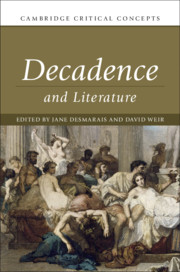Book contents
- Decadence and Literature
- Cambridge Critical Concepts
- Decadence and Literature
- Copyright page
- Dedication
- Contents
- Figures
- Contributors
- Acknowledgements
- Introduction
- Part I Origins
- Chapter 1 Decadence in Ancient Rome
- Chapter 2 Decadence and Roman Historiography
- Chapter 3 Nineteenth-Century Literary and Artistic Responses to Roman Decadence
- Chapter 4 Decadence and the Enlightenment
- Chapter 5 Decadence and the Urban Sensibility
- Chapter 6 Decadence and the Critique of Modernity
- Chapter 7 Decadence and Aesthetics
- Part II Developments
- Part III Applications
- Select Bibliography
- Index
- References
Chapter 7 - Decadence and Aesthetics
from Part I - Origins
Published online by Cambridge University Press: 12 August 2019
- Decadence and Literature
- Cambridge Critical Concepts
- Decadence and Literature
- Copyright page
- Dedication
- Contents
- Figures
- Contributors
- Acknowledgements
- Introduction
- Part I Origins
- Chapter 1 Decadence in Ancient Rome
- Chapter 2 Decadence and Roman Historiography
- Chapter 3 Nineteenth-Century Literary and Artistic Responses to Roman Decadence
- Chapter 4 Decadence and the Enlightenment
- Chapter 5 Decadence and the Urban Sensibility
- Chapter 6 Decadence and the Critique of Modernity
- Chapter 7 Decadence and Aesthetics
- Part II Developments
- Part III Applications
- Select Bibliography
- Index
- References
Summary
In the middle of the eighteenth century, the German rationalist philosopher Alexander Gottlieb Baumgarten originated the ‘science’ of aesthetics as a means of analysing sensuous responses to art and nature. By the end of the century, in his Critique of Judgment (1790), Immanuel Kant demonstrated that aesthetic preferences or judgments of taste operated outside the realm of reason but could nonetheless be subjected to categorical treatment. The relationship between this aesthetic tradition and decadence is an intimate and complex one. Both the stock figure of the aesthete and the aestheticism of ‘art for art’s sake’ are classic decadent tropes with obvious sources in figures such as Théophile Gautier, Walter Pater, and Joris-Karl Huysmans. Yet the connections between aesthetics and decadence are more conflicted than might first appear: historically, aesthetics has served both as a site for the theorization of decadence and as the basis of an attempt to limit it, as in the philosophy of Friedrich Nietzsche. The purpose of this chapter is to examine these intricate ties.
- Type
- Chapter
- Information
- Decadence and Literature , pp. 115 - 130Publisher: Cambridge University PressPrint publication year: 2019



